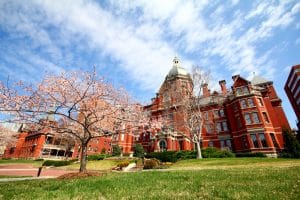What It’s Like to Attend Johns Hopkins?
Deciding where to attend college entails many considerations, and Johns Hopkins offers an exciting choice for many young individuals. This renowned institution, known for its commitment to academic rigor and student involvement, provides many opportunities in a diverse and thriving community.
Understanding the Prestige of Johns Hopkins University
Johns Hopkins University in Baltimore, Maryland, is undeniably one of the world’s most prestigious educational institutions. Known for its dedication to research, advanced innovation, and academic excellence, Johns Hopkins often stands out as a top choice for undergraduate and graduate students globally.
The History and Reputation of Johns Hopkins
Founded in 1876, Johns Hopkins University was the first research university in the United States. It has since upheld its reputation as a pioneer in both research and education. In numerous fields, including medicine, engineering, and arts and sciences, Johns Hopkins continually ranks among the best educational institutions worldwide.
Johns Hopkins University has a long and storied history, with notable achievements and groundbreaking discoveries. For example, the university is renowned in medicine for its contributions to medical research and patient care. It was at Johns Hopkins that the first successful separation of conjoined twins was performed, revolutionizing the field of pediatric surgery.
Furthermore, Johns Hopkins has been at the forefront of scientific breakthroughs. The university’s researchers have significantly advanced cancer treatment, infectious diseases, and neuroscience. Their discoveries have not only improved the lives of countless individuals but have also shaped the direction of scientific research worldwide.
It’s worth noting the university’s name itself bears a rich history. A philanthropist and abolitionist, Johns Hopkins left a substantial part of his wealth to create the institution to advance knowledge for the human good. His vision and generosity continue to inspire and guide the university’s mission.
Notable Alumni and Their Contributions
The institution boasts an impressive roster of alums. Outstanding individuals in various fields, such as Woodrow Wilson, the 28th U.S. president, and Nobel laureate Carol W. Greider, are among its notable alums, testifying to the university’s commitment to nurturing exceptional individuals.
However, the impact of Johns Hopkins’ alums extends far beyond these prominent figures. The university has produced countless leaders, innovators, and change-makers who have left their mark on the world. From leaders in politics, academia, and industry to renowned writers and artists, the community of Hopkins alumni is diverse and impactful. This rich alum network impacts society significantly, contributing to Johns Hopkins’ prestige.
One notable example is Dr. Paul Farmer, a renowned physician and anthropologist who co-founded Partners In Health, which provides healthcare to underserved communities worldwide. Farmer’s work has saved countless lives and inspired a new generation of healthcare professionals to prioritize social justice in their practice.
Another remarkable alumnus is Dr. Mae Jemison, the first African-American woman to travel in space. Jemison holds a degree in chemical engineering from Johns Hopkins and has become a symbol of female empowerment and scientific achievement. Her groundbreaking journey to space is a testament to the university’s commitment to fostering diversity and inclusion.
These are just a few examples of the many extraordinary individuals who have emerged from the halls of Johns Hopkins University. Their accomplishments and contributions testify to the institution’s commitment to excellence and its ability to nurture talent.
How Does the Campus Feel?
Stepping onto the Johns Hopkins campus for the first time is akin to entering a realm where tradition and modernity merge harmoniously. The atmosphere is palpable, buzzing with an intellectual curiosity that’s as infectious as inspiring.
Students hustle between classes, their backpacks laden with textbooks and laptops, while professors engage in animated discussions from the classrooms to the open-air courtyards. Yet, amid this academic enthusiasm, a sense of community is hard to ignore.
The campus exudes a welcoming vibe, whether the friendly nods exchanged between acquaintances or the spontaneous study groups that form in cozy nooks. To truly grasp what it is like to attend Johns Hopkins, you must experience this unique atmosphere, where every corner holds the promise of discovery and every interaction is an opportunity for growth.
Architectural Aesthetics
The architecture at Johns Hopkins is a visual feast that mirrors the institution’s commitment to excellence. Historic buildings, adorned with intricate carvings and Gothic arches, starkly contrast modern structures with sleek lines and innovative designs.
This juxtaposition is a metaphor for the university—where time-honored traditions meet cutting-edge advancements. Strolling through the campus, you’ll encounter a variety of architectural styles that tell a story, not just of the university’s history but of its forward-thinking ethos.
It’s a place where the past and the future coexist, offering a rich tapestry that adds another layer to what it is like to attend Johns Hopkins.
Campus Resources
Regarding resources, Johns Hopkins leaves no stone unturned in providing its students with the best. The libraries are more than just repositories of books; they’re hubs of academic activity, equipped with state-of-the-art research tools and collaborative workspaces.
Then there are the laboratories, replete with cutting-edge technology that enables groundbreaking research. But it’s not all academics; the university also places a strong emphasis on mental well-being, offering wellness centers and counseling services that are easily accessible.
These resources are not mere amenities; they’re integral to the student experience, shaping what it is like to attend Johns Hopkins in ways that go beyond the classroom.
Social Scene
Ah, the social scene—a facet of college life that’s as important as academics, if not more so. At Johns Hopkins, you’ll find many extracurricular activities catering to various interests. Whether you’re an aspiring artist, budding entrepreneur, or social justice advocate, a club or organization is perfect for you.
Greek life also has a presence on campus, offering yet another avenue for social engagement. But what sets the social scene apart is its inclusivity. It’s a space where diverse perspectives are welcomed and valued, creating a sense of belonging that is difficult to find elsewhere.
The social interactions you’ll have, the friendships you’ll forge, and the communities you’ll become a part of all contribute to what it is like to attend Johns Hopkins.
The Academic Experience at Johns Hopkins
Johns Hopkins provides robust academic experiences that place it at the forefront of higher education institutions. The university’s commitment to research, innovation, and intellectual rigor offers students an enriched and fulfilling educational journey.
At Johns Hopkins, the academic experience goes beyond traditional classroom learning. Students are encouraged to actively engage in their education, exploring their interests and passions in a supportive and intellectually stimulating environment.
With a wide range of majors and programs, Johns Hopkins caters to diverse academic interests. The university’s renowned schools, such as the School of Medicine and the Peabody Institute, provide comprehensive and in-depth studies in their respective fields.
But it doesn’t stop there. Johns Hopkins also encourages interdisciplinary studies, allowing students the flexibility to explore interests across various disciplines. This multidisciplinary approach fosters creativity, innovation, and a broader understanding of the interconnectedness of knowledge.
Overview of Majors and Programs
With over 50 majors and 40 minors, Johns Hopkins offers a plethora of academic options for students to choose from. Whether you’re interested in the sciences, humanities, social sciences, or the arts, there is a program that will cater to your academic aspirations.
The School of Medicine offers a world-class education for those interested in healthcare, preparing students to become future healthcare leaders. The Peabody Institute, on the other hand, is renowned for its music programs, providing aspiring musicians with the training and mentorship they need to excel in their craft.
It’s also worth mentioning that Johns Hopkins highly encourages interdisciplinary studies. Students have the opportunity to combine majors and minors from different departments, creating a unique and tailored academic experience that aligns with their interests and career goals.
Research Opportunities and Facilities
Johns Hopkins University is not only known for its exceptional academic programs but also for its commitment to groundbreaking research. The university is a leader in research funding, positioning it as an excellent choice for those seeking intensive research opportunities.
With state-of-the-art facilities and resources, Johns Hopkins provides students with the tools to conduct cutting-edge research. Whether in biomedical engineering, international studies, or any other discipline, students can access numerous institutes and centers dedicated to advancing knowledge through research.
Research opportunities at Johns Hopkins extend beyond the campus. The university has strong partnerships with leading research institutions and organizations, both nationally and internationally, allowing students to collaborate with experts in their fields and make meaningful contributions to their respective disciplines.
Faculty and Teaching Style
At Johns Hopkins, the faculty is a critical component of the academic experience. Professors are not only experts in their fields but also dedicated educators who are passionate about fostering intellectual growth.
With a low student-to-faculty ratio, students can engage in meaningful discussions and receive personalized attention from their professors. This close interaction with faculty members allows mentorship opportunities and encourages students to think critically and independently.
The teaching style at Johns Hopkins goes beyond traditional lectures. Professors employ innovative teaching methods, such as case studies, group projects, and hands-on experiences, to ensure students are actively involved in learning. This approach fosters critical thinking, problem-solving skills, and a deeper understanding of the subject.
Moreover, the university values diversity and inclusivity in the classroom. Students from different backgrounds and perspectives come together, creating a vibrant learning environment where ideas are challenged, and new insights are gained.
Student Life at Johns Hopkins University
Beyond the rigorous academic journey, life at Johns Hopkins University encompasses a variety of elements that shape students’ college experiences.
At Johns Hopkins University, the student life experience goes beyond the classroom. From housing and residential experience to clubs, activities, and campus events, students have numerous opportunities to engage, connect, and grow.
Housing and Residential Experience
Residential life is a significant component of the Johns Hopkins experience. Students have various housing options, ranging from traditional dorms to apartments, encouraging a sense of community among students.
Living on campus offers students a unique opportunity to immerse themselves in the vibrant college atmosphere. The residence halls are not just places to sleep and study but also hubs of social interaction and personal growth. Students often form lifelong friendships with their roommates and neighbors, creating a support system beyond the classroom.
In addition, a vast array of amenities, from dining halls to recreational centers, ensures a comfortable and enriching residential experience. The dining halls offer various culinary options, catering to different dietary preferences and cultural tastes. The recreational centers allow students to stay active and healthy with state-of-the-art fitness equipment and organized sports activities.
Clubs, Activities, and Campus Events
Student life at Johns Hopkins also includes over 400 clubs and organizations. From academic societies to performing arts ensembles, students can pursue their passions and connect with like-minded individuals.
Joining a club or organization allows students to explore their interests outside the classroom and develop valuable skills. Whether it’s joining a debate team, participating in a community service organization, or performing in a dance group, there is something for everyone at Johns Hopkins.
Campus events like the Spring Fair also promote an engaging community environment. Spring Fair is an annual event that brings together students, faculty, staff, and the local community. It features live music performances, food vendors, carnival rides, and various activities that showcase the talents and diversity of the Johns Hopkins community.
Diversity and Inclusion Initiatives
Fostering a diverse and inclusive environment is at the heart of Johns Hopkins University’s mission. Numerous initiatives and resources aim to ensure all community members can thrive, from multicultural affairs to programs supporting first-generation college students.
Johns Hopkins celebrates its diverse student body and actively works towards creating an inclusive campus culture. Cultural and identity-based organizations provide spaces for students to connect with others with similar backgrounds and experiences. These organizations often host events, workshops, and discussions that promote dialogue and understanding.
This commitment to diversity enriches the student experience and fosters a greater understanding of different cultures, perspectives, and experiences. Students can learn from one another, challenge their assumptions, and develop a global mindset that will serve them well in their future endeavors.
Navigating the Admissions Process
As eager students consider making Johns Hopkins their home for the next few years, it’s essential to understand the admissions process.
Choosing the right university is a significant decision that can shape one’s future. With its rich history and renowned academic programs, Johns Hopkins University has become a top choice for many aspiring students. However, gaining admission to such a prestigious institution requires careful navigation through the admissions process.
Understanding the admissions criteria and requirements is the first step toward a successful application. Johns Hopkins looks for academically accomplished, dedicated, innovative, and willing students to contribute to its community. The university values creativity, curiosity, and involvement in an applicant’s high school experience, as these qualities demonstrate a well-rounded individual.
Meeting the requirements for admission is crucial. These requirements typically include standardized test scores, transcripts, personal essays, and letters of recommendation. Each component allows applicants to showcase their unique strengths and experiences. The personal essay, in particular, will enable students to express their passions, motivations, and aspirations, giving the admissions committee a deeper understanding of who they are as individuals.
Financial Aid and Scholarships
Financing a college education can significantly concern many students and their families. Fortunately, scholarships and financial aid packages are available to help students finance their education at Johns Hopkins. The university is dedicated to making higher education accessible by meeting 100% of the demonstrated financial need for all students who show academic potential.
Financial assistance at Johns Hopkins combines grants, scholarships, loans, and work-study opportunities. This comprehensive approach ensures that students have various options to fund their education while minimizing the burden of student loans. The university’s commitment to financial aid reflects its dedication to providing equal opportunities for all students, regardless of their economic background.
Tips for a Successful Application
For those applying to Johns Hopkins, showcasing academic strength and personal passion is vital. While academic achievements are essential, the admissions committee wants to see applicants’ interests and extracurricular involvements. Be genuine in your application and let your authentic self shine through.
Remember to review all application requirements and deadlines carefully. Missing a deadline or failing to submit a required document can significantly impact your chances of admission. To ensure a smooth application process, maximize available resources, such as conversations with high school counselors and attending interactive sessions hosted by the university. These resources can provide valuable insights and guidance, helping you present your best self in your application.
Applying to Johns Hopkins is not just about gaining admission to a prestigious university; it is about joining a community of scholars, innovators, and leaders. The university offers a dynamic university experience that blends rigorous academics with a vibrant student life. From cutting-edge research opportunities to a wide range of extracurricular activities, Johns Hopkins nurtures future global leaders and agents of change.
How Do You Become a Part of the Johns Hopkins Community?
The community at Johns Hopkins is built on a foundation of academic rigor, but it extends far beyond the classroom walls. You’ll find that the campus is a melting pot of cultures, ideologies, and interests, all merging into a vibrant tapestry that is as inviting as it is challenging.
To truly understand what it is like to attend Johns Hopkins, you must immerse yourself in this tapestry. Engage in intellectual debates, participate in student-led initiatives, and don’t shy away from those serendipitous conversations that start in the library and end in a lifelong friendship.
The college experience is defined by a symbiotic relationship between the individual and the community, where active contribution shapes and is shaped by both parties.
Orientation Programs
Orientation is your first formal introduction to life at Johns Hopkins, and it’s designed to be as enlightening as it is enjoyable. Picture this: You arrive on campus, your heart pounding with excitement and trepidation, only to be greeted by a cadre of enthusiastic orientation leaders who’ve been where you are and know how to ease your transition.
These programs are meticulously planned to give you a taste of everything—from academic expectations and research opportunities to the rich tapestry of extracurricular activities. You’ll attend workshops, go on campus tours, and even participate in community service projects to acclimate to your new environment.
By the end of orientation, you’ll have a clearer understanding of what it is like to attend Johns Hopkins, and you’ll be armed with the tools and resources to make the most of your time there.
Networking and Alumni
The Johns Hopkins network is a treasure trove of opportunities, and it’s never too early to tap into it. From the moment you set foot on campus, you’re part of an illustrious lineage that includes Nobel laureates, entrepreneurs, and leaders in every field imaginable.
The university’s alum relations office organizes many virtual and in-person events to facilitate interactions between current students and alums. These aren’t just cursory meet-and-greets but platforms for meaningful dialogue, mentorship, and even potential job opportunities.
To truly grasp what it is like to attend Johns Hopkins, you must leverage this network. Engage with alums who share your academic interests or career goals. Listen to their stories, learn from their experiences, and don’t hesitate to seek their advice.
Remember, today’s network is tomorrow’s opportunity, and the Johns Hopkins community extends far beyond your years on campus, offering a lifetime of connections that can enrich your personal and professional life.
Ready to Make Johns Hopkins Your Next Academic Adventure?
You’ve delved deep into what it is like to attend Johns Hopkins, from the vibrant community and enriching orientation programs to the invaluable networking opportunities with esteemed alums. Are you ready to take the next step and make this prestigious institution your academic home? Navigating the complexities of college admissions can be daunting, but you don’t have to go it alone.
AdmissionSight is here to guide you every step of the way.
As experts in U.S. college admissions, we specialize in turning your academic dreams into reality. Our tailored consulting services offer personalized guidance that resonates with your unique needs and aspirations. Whether it’s crafting a compelling application essay, preparing for interviews, or strategizing for standardized tests, we’ve got you covered.
Don’t leave your future to chance. Partner with AdmissionSight and unlock the doors to a transformative education at Johns Hopkins University. Your journey to excellence starts here.









































